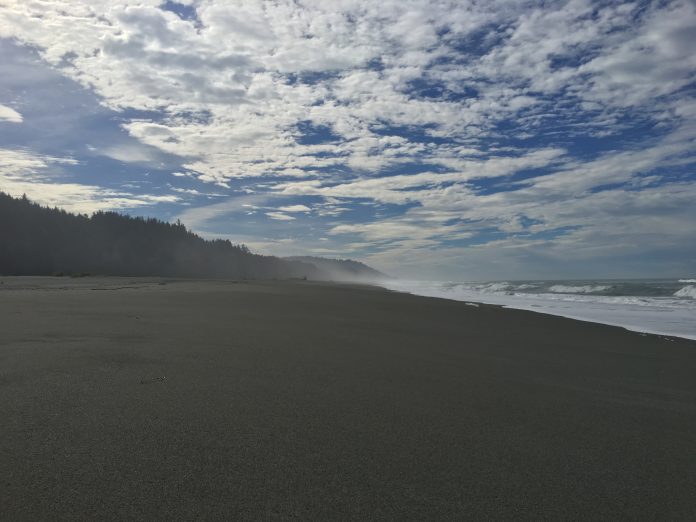Of course it would be during a rainstorm, on the Oregon coast and three hours away from the closest mechanic, that my windshield wipers decided to stop working. A drastic change from how I imagined my reading break to start out, I quickly learned just how hard driving without wipers can be.
A combination of driving slowly and pulling over when the amount of rain became unbearable, it took almost an extra two hours to get to Newport where I was planning to spend the night.
The next morning was a dilemma: I could head to Eugene, taking a nearly four-hour detour from my planned route all the way down the coast along the 101, and potentially have to wait days for a part to come in (one of the many downsides to driving a German car). Or, because the weather forecast promised three straight days of sunshine, I could buy a bottle of Rain-X, use those three days to camp on the beach as originally planned, and simply hope for the best and deal with the worst if and when it happened.
It was a tough choice and I even hesitated at the stop sign, second-guessing myself while staring at the road sign with an arrow showing which way to Eugene and which way back to the coast.
Heading to Eugene and fixing my car was obviously the smarter option, and the clear skies guaranteed I would make it there safely. But the whole point of this trip wasn’t to choose the smart option — if I wanted to do that, I would have stayed home and spent the reading break catching up on homework and studying for midterms instead of hoping that my most recent paycheque would stretch far enough to get me somewhere sunny and back. Plus, detouring meant wasting some, maybe even all, of the three days of sunshine that I had been looking forward to ever since the 14 day forecast showed them.
I’m proud to say that I made the right decision and it didn’t take long at all until I was on a beach as intended — waiting on the windshield wipers was worth the risk.
These kinds of risks aren’t always worth it — I’m not encouraging putting your safety at risk for the sake of adventure — but sometimes they are. It’s the “safe options” that slowly create a lifestyle that’s more concerned about what could go wrong than what could go right. As a result we miss out on opportunities that, yes, could end negatively, but could also turn out better than we imagined.
Kayt Sukel, author of The Art of Risk: The New Science of Courage, Caution, and Chance, explained in an article published by Fox News that taking risks, what she describes as making any decision that has an uncertain outcome, can come with more benefits than just occasionally yielding good results. Sukel explains that rather than reminding parents of all the dangers that their children could potentially encounter, activists and educators are now suggesting that parents encourage and let their children take more risks on their own.
“It’s because we’ve learned that taking chances in school and play offers incredible opportunities for children to learn how to problem solve, to regulate stress and emotion, to take initiative, to improve their physical skills, to work better with others … seasoned risk-taking offers those very same opportunities to adults by helping individuals gain the priceless experience they need to make smarter, better decisions,” she writes.
Despite this, most of us find taking risks intimidating and a study completed by UBS Wealth Management Americas showed that millennials aged between 21 and 36 are the most risk averse generation since the Great Depression. This can obviously have its benefits and the Financial Post reported on a study conducted by Tangerine that found that 62 per cent of Canadians between 18 and 34 are already saving for retirement. Half of those started before the age of 25 — a significant increase from the 18 per cent of Canadians between the ages of 35 and 56 that reported to be saving for retirement at the same age.
However, the fear of failure and rejection that comes with this risk aversion translates into almost every other area of life as well: the Atlantic recently reported a decrease in millennials becoming involved in politics or running for public office, and, despite being labeled as the “hookup generation,” millennials are having sex less often and with fewer partners compared to other generations, according to Vancouver Metro News.
This pattern of always playing it safe has become more than just something we do when necessary, but is preventing us from experiencing life to the fullest.
I still don’t know if choosing the ocean over windshield wipers was the right decision — but I’m writing [most of] this on a beach in the Redwood Forest in California while watching the sun set as the tide comes in, so I’d say so.
Update: It was only partially worth it. Turns out Rain-X doesn’t really work well enough to make it all the way back home from California in the pouring rain, but it also turns out that fixing your windshield wipers can cost $900 (American), so it’ll have to do for now.


